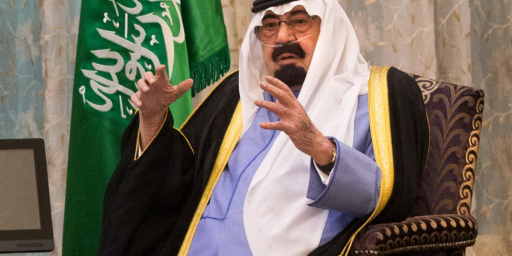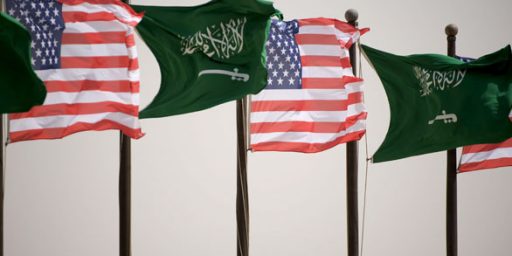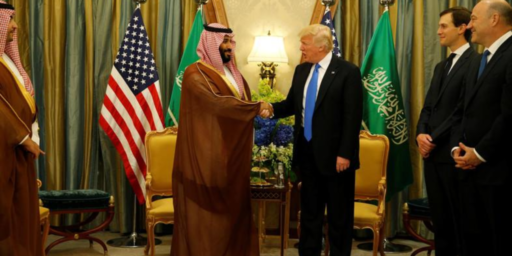Iraq’s Foreign Fighters: Few But Deadly
Dan Murphy passes on word of a report by Anthony Cordesman and the Center for Strategic and International Studies which says that much of what has generally been though about foreign jihadists in Iraq is wrong.
Iraq’s Foreign Fighters: Few But Deadly (CSM, p. 1)
Much of the US effort in Iraq in recent months has been aimed at stopping the inflow of foreign jihadis. US warplanes have blown up bridges to deny insurgent infiltration routes, troops have occupied small towns thought to be crossing points for foreigners into bigger cities, and spy drones continuously buzz the Syrian border.
Even if the US can seal Iraq’s borders, stopping the flow of foreign fighters would do little to eliminate most of the country’s insurgents. Only 4 to 10 percent of the country’s combatants are foreign fighters, according to a report from the Center for Strategic and International Studies released last week. But while they are a minority, says the report, they are a potent segment largely from Algeria and Syria.
“The fact that there are 3,000 foreign fighters in Iraq is cause for alarm, particularly because they play so large a role in the most violent bombings and in the efforts to provoke a major and intense civil war,” write coauthors Anthony Cordesman, a former director of defense intelligence assessment for the secretary of Defense, and Nawaf Obaid, a Saudi national and security analyst. Based mostly on Saudi intelligence, they estimate that active members of the insurgency number about 30,000.
Since the fall of Saddam Hussein, the report says, Iraq has become one of the global centers for the recruiting and training of what Mr. Cordesman and Mr. Obaid term “neo-Salafi” terrorists. These are essentially Islamist fighters that share Al Qaeda’s extreme rejection of non-Muslim “infidels” and seek to create Islamic states patterned after the Arabian peninsula of the 7th and 8th centuries.
Also, the large numbers of foreign fighters who may survive the conflict are likely to return to Saudi Arabia, Egypt, and Algeria carrying terrorism skills and highly radicalized world views with them, they write. “They are also a threat because they give bin Laden and other neo-Salafi extremist movements publicity and credibility among the angry and alienated in the Islamic world, and because many are likely to survive and be the source of violence,” in other countries. Most of Iraq’s fighters, they say, are Sunni Arab “nationalists” who distrust Shiites now in power. Foreign fighters, the report claims, are seeking to manipulate this distrust into a wider civil war.
The authors also point out that the “fly paper” theory about the Iraq war – that a limited global number of Islamic militants would be lured to Iraq and destroyed – is probably incorrect. Instead, they estimate that many of the foreigners fighting in Iraq were peaceful before the US invasion.
Damning, if true. One wonders about the “many” jihadists who were formerly peaceful, though. What percentage would that be, exactly?
The full report, “Saudi Militants in Iraq: Assessment and Kingdom’s Response,” is at the CSIS site. (Executive Summary | Full Report) [both PDF]
Worth noting:
As for the question of the composition and the size of the foreign volunteers in the Iraqi insurgency, the study estimates that there are 3,000 fighters. Those fighters come from all around the Arab and Islamic worlds. The largest component of these fighters come from Algeria (600 or 20%), followed by Syria (550 or 18%), Yemen (500 or 17%), Sudan (450 or 15%), Saudi Arabia (350 or 12%), Egypt (400 or 5%), and other countries (150 or 5%).
The Saudi involvement in the Iraqi insurgency is overestimated, but does have an impact that goes beyond the number of insurgents involved: “Unlike the foreign fighters from poor countries such as Yemen and Egypt, Saudis entering Iraq often bring in money to support the cause, arriving with personal funds between $10,000-$15,000. Saudis are the most sought after militants; not only because of their cash contributions, but also because of the media attention their deaths as “martyrs†bring to the cause. This is a powerful recruiting tool. Because of the wealth of Saudi Arabia, and its well developed press, there also tends to be much more coverage of Saudi deaths in Iraq than of those from poorer countries.â€
I agree with this conclusion:
[T]he outcome in Iraq is going to be determined by how well Iraq̢۪s political process can find an inclusive solution to bringing Arab Sunnis, Arab Shiites, Kurds, and Iraqi minorities into a state that all are willing to support. Military action, counterinsurgency, and counterterrorism cannot unite or build a country. They cannot put an end to Iraqi insurgency or creating the climate of popular support that neo-Salafi movements and foreign volunteers can operate it.
That doesn’t make military action unnecessary, 0f course. Indeed, creating security is an essential prerequisite to establishing effective governance. It is not, however, sufficient.






If 3,000 foreign fighters are some 4% to 10% of the total number of insurgents this means that the total number of insurgents ranges from 30,000
to 75,000.
If even the 30,000 number is accurate this presents a very different picture of the insurgency.
The numbers I have heard put the insurgency at 5,000 members two years ago and 20,000 a year ago. But for the last year I keep hearing that the number held steady at around 20,000.
But if the insurgency has increased to 30,000 rather then remaining constant at 20,000 it presents a very different picture of the battle.
If there are now 20,000 it meas the last year
has been a draw — a big improvement.
But if the number of insurgents is now 30,000
or higher we have been doing much worse.
That would be 100% James. Or close enough to it that it doesn’t matter.
This is not surprising to anyone who has been paying attention to reality based reporting instead of administration propaganda. If you were reading Juan Cole you would have known this long ago.
Ken: I read Juan Cole as often as I can stomach. Your contention is that he’s an objective analyst? Please.
James, Cole is about as objective as you or anyone who supports the war.
Please note that the U. S. military was peaceful before invading Iraq. Bombs are also harmless until detonated and poisoned gas harmless until released.
It’s a circular argument—self-defining and unproveable.
It’s pretty hard to downplay the role of foreign fighters in Iraq when the number 1 man leading the terrorsists and leader of al Qaeda in Iraq is Abu Musab al Zarqawi, from Jordan.
I’d like to see the number of “foreign fighters” that are “reported” vs. those who actually strap on a vest and go Kablooey.
Ken- no rebuttal necessary. You’re so far out there, man. I suppose those “little Eichmanns” deserved it?
Cole knows his stuff James. He is probably the best expert available who regulary writes about the middle east. And yes, he is objective in the sense that any bias he has is a bias towards fact. And just because you do not like the facts does not mean that the writer is biased against you.
Anyway, in this case, he was right all along.
Yeah, just ask him.
ken, I’m curious about what you’re basing your estimate of Professor Cole’s credentials on. His area of study appears to be contemporary Middle Eastern religious movements particularly Shi’a and Baha’i. He’s never been to Iraq and, to the best of my knowledge hasn’t been to Iran in 25 years. I believe that most of his actual time in the Middle East was in Lebanon.
Not all Middle Eastern scholars appear to be as impressed as you are. There’s some evidence that native Arabic speakers find his command of the language amusing.
I know he’s a bigwig in Middle Eastern scholarly circles. I’ve read his C. V. Why do you think his expertise is relevant? I’m not challenging you. I genuinely want to know.
Foreigners have always constituted a very small share — under 5% — of the number of prisoners.
Unless you have a reason to think that foreigners are better at evading capture,
this report just confirms the impression
the prisoner count has provided all along.
Dave, Cole speaks passable Arabic but he reads it as well as any educated Arab. This is not surprising as he is a middle east scholar based in the US so he doesn’t have a lot of practice speaking with the native born. I believe he is fluent in at least eight languages.
There may be other ‘experts’ on the middle east but Cole has made himself available through the internet as no one else with equal expertise or credentials has. His credibility has been earned by being right about the facts when the MSM was nothing but a propaganda organ for the Bush War on Iraq.
I am sure some middle eastern scholars are jealous of his renown, after all, academic rivalries can get out of hand. Anyone who steps out and bests his colleagues, as Cole has, with a blog that had become the authoritative source for information on the players and what his happening in the region is bound to make some people angry at being left behind.